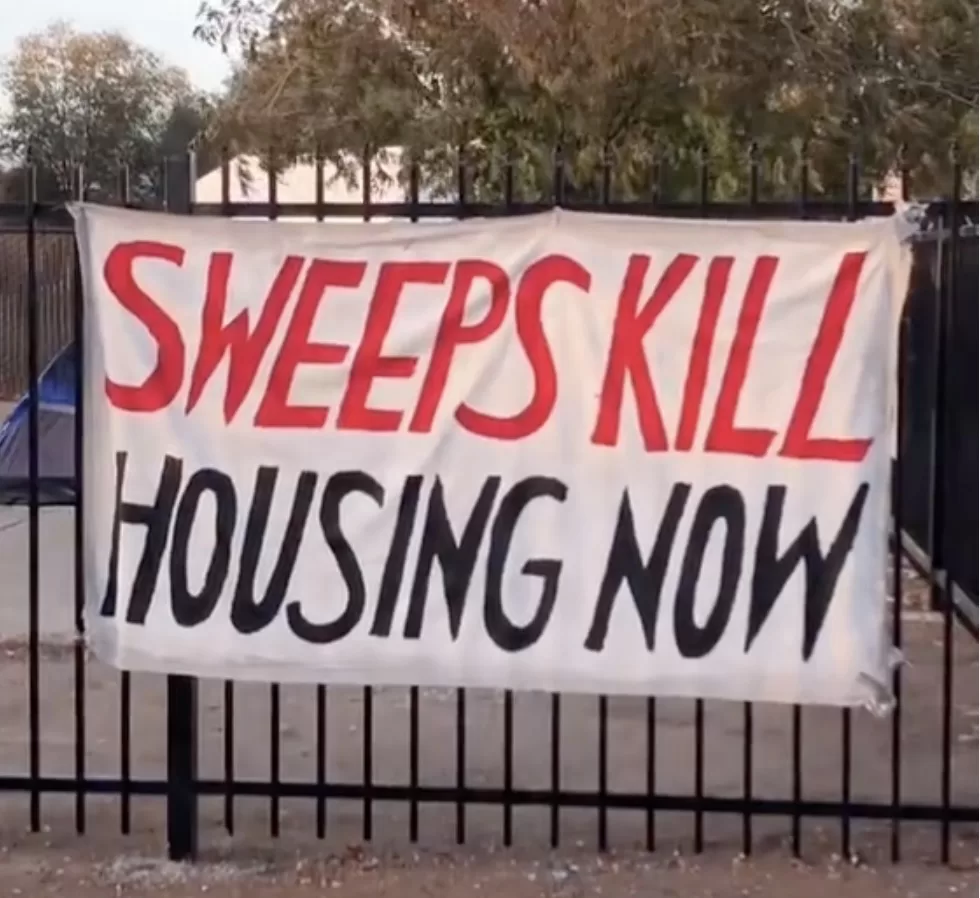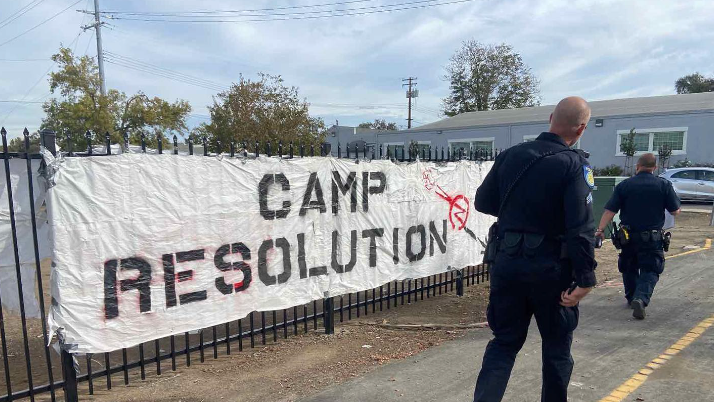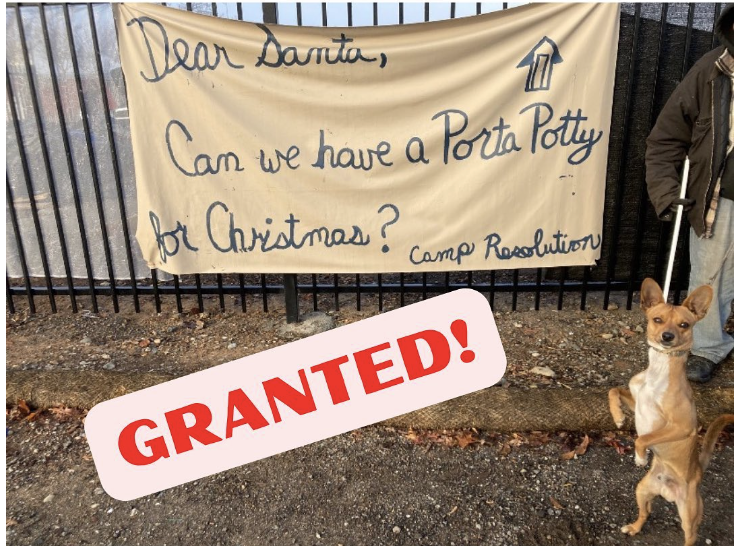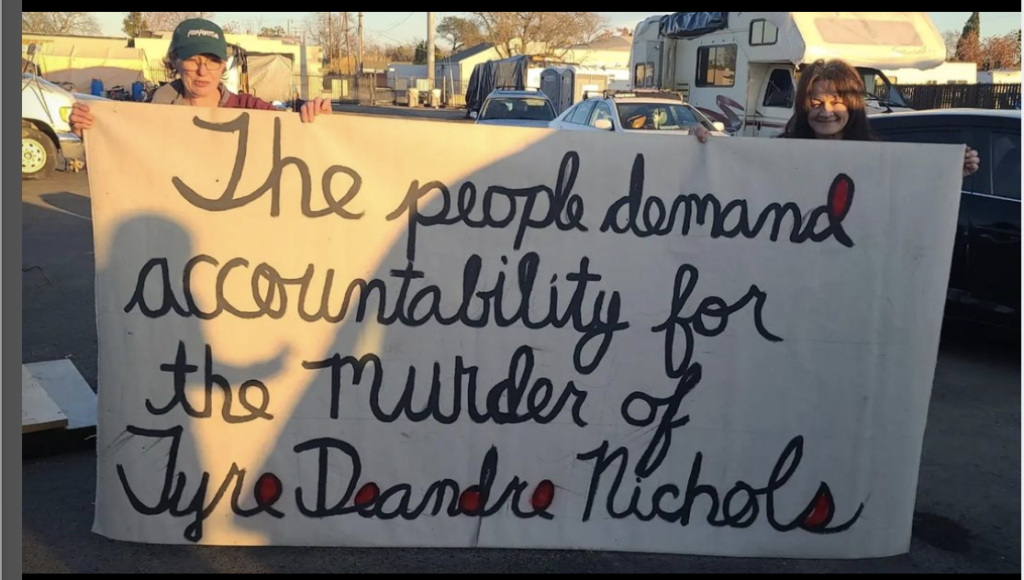
SACRAMENTO, CA. They – the powers that be – don’t want this to happen, but it’s happening anyway. In Sacramento, Oakland, in cities across the West Coast – and other places too – unhoused residents have banded together and built self-governing settlements. Their stories show that unhoused residents can find power in the midst of dispossession and loss, and can learn to resist eviction, fighting together for each other and for their shared goal of stability in a place, a space, a bit of the planet where the government says they cannot go. The story of their struggle also shows how the broader community gathers to nurture and support these encampments as a common project.
But there’s more. It turns out that self-government – balancing community needs and individual autonomy in a stable environment – is crucial to psychic health. Isolation, feelings of despair, powerlessness, and rage – triggered by the trauma of being houseless – are conditions directly addressed by communal self-governance. As one resident of Oakland’s self-governing Wood Street Commons put it, it’s like “medicine.”
The meaning of these encampments shines in illuminated letters – a testament to human ingenuity, tenacity, and fellow feeling – against a background of bitter abandonment and deliberate destruction. The few encampments run by cities and counties are, by contrast, places where searches, curfews, and controls require residents to trade their agency, their freedom, and privacy, for 2 bag lunches per day and temporary occupancy of a tent or tuff shed without electricity or running water. Self-governed settlements are a different story.

Why Do the “Powers That Be” Destroy Settlements Instead of Working with Them?

Public agencies dole out funds for the “lucky few” who may qualify for an apartment – but at the same time, they wage war against the many left outside and deny these unhoused residents resources like trash pick-up, water, sanitation – in fact, any and all assistance with their living situation. The evident policy is that basic protections cannot be extended to settlements of unhoused residents on public land. It’s a crazy, harmful policy. Why deny residential services, when providing them would improve relationships between housed and unhoused neighbors and promote community-wide health and healing? Why not help and support self-governance instead of destroying communal settlements?
The reason for this policy is that recognizing the needs of informal settlements, and stabilizing them, would empower unhoused residents as a community and class. Stability, that essential condition of human life, fosters power and independence. That power and independence threatens the system by creating avenues for political organization and for advancing visions of a cooperative future.
If you doubt this motivation for the constant destruction and dispersal of communal living, consider the conduct of the LAPD on February 13, 2023, which made the news in an article headed, “The city’s demolition of a canopy tent house that served as the home of an activist and an ad hoc community center has skid row residents outraged.” (LA Times 2/20/23) Stephanie Williams, a Black woman, created this center as “a safe haven, a safe place where people could come and rest.” The tents across the street were not destroyed. The safe haven was.
Self-governed settlements, like Stephanie Williams’ canopies, undermine the system of constantly demonizing, destabilizing, and dispersing unhoused residents, thereby robbing them of their political voice. With stability, unhoused residents find their own help, forge networks and mobilize their allies. They organize for common space, communication channels, and distribution of resources. They pound away relentlessly and challenge their disempowerment through every channel, including the courts, local boards and councils, and the state legislature.
Here is a story of significant, if fragile, recent wins:

CAMP RESOLUTION
Sacramento, California
Perhaps it doesn’t look like much – a sprawling empty lot, part paved, part gravelly dirt, on a nondescript street in the northern reaches of the city, a lot fenced at great expense for the express purpose of keeping out the houseless. According to the regional water quality board, the soil is contaminated and unfit for human occupancy. But in a city where thousands live unlawfully outside, this unwanted city-owned open space has become a battleground between the dozens of unhoused people who cut the lock on the fence and boldly took possession of the lot, and the police forces mobilized by the city government to bring about their mass eviction. As we go to press, the threat of eviction looms again.

As reported in the last issue of Homeward, on November 15, 2022, residents and their allies converged at a City Council meeting to urge the city to cancel yet another imminent eviction and work with residents to preserve the self-organized settlement, which they named “Camp Resolution.” These residents came together not just for temporary housing, but to create a protest camp, established to demand housing for themselves and the unhoused community as a whole, and to call for the transformation of the chaotic, underfunded local emergency response system that does so much harm to unhoused people in the way that it cycles people in and out of the shelter, intensifying the ongoing instability of their lives.
Perhaps the best evidence of Camp Resolution’s evolution is their advocacy for Holly Porter, a resident who is partially paralyzed, cared for by her family and by other residents, and confined to a hospital bed operated with a hand crank in her tent. The residents have made the demand that Holly and her caregiver be housed. The dire urgency of the situation, and the city’s shameful neglect, made front-page news in Sacramento.
The future of Camp Resolution is uncertain, its unity fragile, but this achievement and the legacy of autonomy – of resolution – stands as an example for unhoused organizers in the future.
Wood Street Commons
Clustered in the wastelands beneath the concrete pillars of West Oakland’s vast freeway exchanges, settlements on Wood Street have organized and fought evictions for years, bringing together activists and artists to celebrate their lineage as rebels in the city that birthed the Black Panthers. Currently, just one community of about 60 people remains.
Resident John Janesco recently sketched the activities at Wood Street Commons and the need to preserve it from destruction:
“Right now we are self-governed. Used to be just tents and one RV. Now we have friends and supporters visiting, we are preparing meals, and keeping clothing closets. We pick up donations ourselves, we have shelter here, and we have 8 couches where people can crash in the middle of the night. We have blankets and sleeping bags that we have been given. We feed people and we volunteer. We have a medical van come here and we coordinate appointments. We have no gunshots or problems because we have a code of conduct that people respect.
Don’t close the lot — use it as a model. We are helping one another, and that is what community is about. If we are dismantled people will go out on the street and be scared.” (KPFA radio, 1/4/23)
Given the uncertain future of housing in this country, and the rising millions who cannot afford it, the struggle of the unhoused is, in a sense, just beginning. Self-governing encampments are leading the way, demanding the right to live in a stable environment until housing is made available.
At Wood Street Commons, in January, the tightly knit community of residents organized and brought suit against the city’s threatened police action to destroy the settlement. On February 11, Wood Street Commons got a temporary restraining order blocking their eviction, pending the construction of replacement cabins.
Check out Wood Street Commons on the Web – WoodStreetCommons.com. This article is indebted to the sources cited on the website, including a film by Martin Reade and articles by John Janesco and LaMonte Ford.
(Editor’s Note: This article has also appeared in the Sacramento-based street newspaper Homeward)

